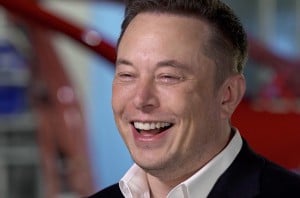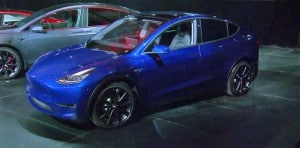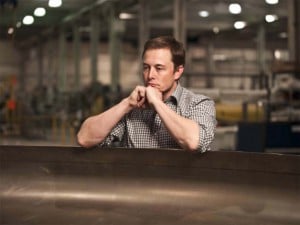
Why is this man smiling? Tesla CEO Elon Musk could be in for a massive payday if Tesla’s stock keeps soaring.
Tesla shares continue to set new records each day, the stock closing at $524.86 on Monday and surging to yet another record, nearly $540 in midday Tuesday trading.
That’s certainly great news for Tesla investors, including CEO Elon Musk, who holds about 34 million shares, or 19% of the EV automaker’s stock. But Musk could be in for another big payoff if things keep moving in this direction.
If Tesla can hit and hold a market capitalization of $100 billion, the South African-born executive could take home a cool $346 million pay package, one of the largest payouts ever for an American executive. But that could be just the beginning, under terms of a deal Musk worked out with the Tesla board of directors in 2018.
“This is the very definition of pay for performance,” Ian Keas, senior director at Longnecker & Associates, an executive compensation consulting firm, told the Reuters news service. “But is he the only individual that could serve in that seat as CEO and deliver that value to shareholders? That’s the billion dollar question.”
Actually, there’s another big question: can Musk hold onto his seat? He was forced to relinquish his post as Tesla chairman in 2018 due to the controversy over his claim that Tesla would go private, with funding supposedly coming from the Saudi Arabian sovereign investment fund. Musk paid a $19 million fine and kept his CEO post. But when he continued tweeting in violation of a settlement with the SEC last year, the agency considered forcing Musk out entirely. He ultimately paid another fine, agreed to run “material” comments through Tesla’s lawyers, and stayed on as chief executive.
(Will gravity step in and bring Tesla’s soaring stock back down to Earth?)
Proponents say few executives have been more materially linked to the success of their company. Despite – or perhaps because of — his propensity to make outrageous claims and comments – among other things, getting sued for calling a British diver a “pedo guy” – Musk has become the public face of Tesla.
“When he walked on stage for the debut of the Cybertruck (in November), people in the audience started jumping up and down as if he were a rock star,” recalled auto analyst Charlie Vogelheim, who was in the crowd for the preview.
How much of his persona is at play on the stock market is hard to calculate, but Tesla shares have more than doubled over the last three months and, though its shares have a tendency to ride a rollercoaster, with massive ups and downs, all seems to be moving in the right direction.
The company delivered an unexpected profit for the third quarter of 2019. And now, it is ready to roll out an assortment of new products, starting with the Model Y SUV coming later this year, and followed by the Cybertruck pickup, the reborn Tesla Roadster and the big Tesla Semi. The automaker also is ramping up production at its new Shanghai assembly plant and getting ready to build a third assembly line in Berlin.
If Tesla can deliver enough to keep the stock rising, Musk could eventually receive a total of 12 tranches of options that would earn him over $4 billion, all told. But each would only be triggered by a sustainable $50 billion increase in Tesla’s overall market capitalization over a 10-year period.

The Model Y, shown here at its debut, will be critical to Tesla’s success – and Musk’s next big payday.
Even before hitting the $100 billion mark, the recent surge in the automaker’s stock price means Wall Street now values Tesla more than General Motors and Ford Motor Co. combined. But is it, indeed, sustainable?
(CEO Musk says Tesla to build new Gigafactory near Berlin)
Despite all the potentially positive developments looming for Tesla, the automaker must first deliver solid numbers for the final quarter of 2019 and continue to keep itself in the black for 2020 and beyond – no mean feat for a company that has so far only turned a profit a handful of quarters.
Final sales numbers for 2019 will soon be released, but demand for Tesla products like the Model 3 flattened out towards year-end, and have slid for its older Models S and X. Meanwhile, federal tax incentives for the company’s customers were phased out entirely as of January 1. Last year, the carmaker had to cut prices in order to rebuild demand.
Overall, the U.S. electric vehicle market was “virtually flat” in 2019, said Eric Ibara, a research director with Kelley Blue Book, who doesn’t see a major surge this year – at least until late 2020 when the Tesla Model Y debuts. But, the automaker also will face a new surge of competition as brands including Cadillac, Audi, Ford, Volkswagen and Mercedes-Benz and others start rolling out new long-range BEVs.
(China’s annual New Energy Vehicle sales declined in 2019. What might that mean for Tesla?)
Such concerns explain why short-sellers continue to hold about 20% of Tesla stock, significantly more than most other companies.
Tesla’s market capitalization is just one of the targets the company must hit for Musk to get his series of payouts under the deal approved in January 2018. But it hit two milestones last year, including topping $20 billion in revenue.
The biggest potential payout to date for an executive was the $638 mllion Snap founder Evan Spieel received following the social network firm’s IPO in 2017.

